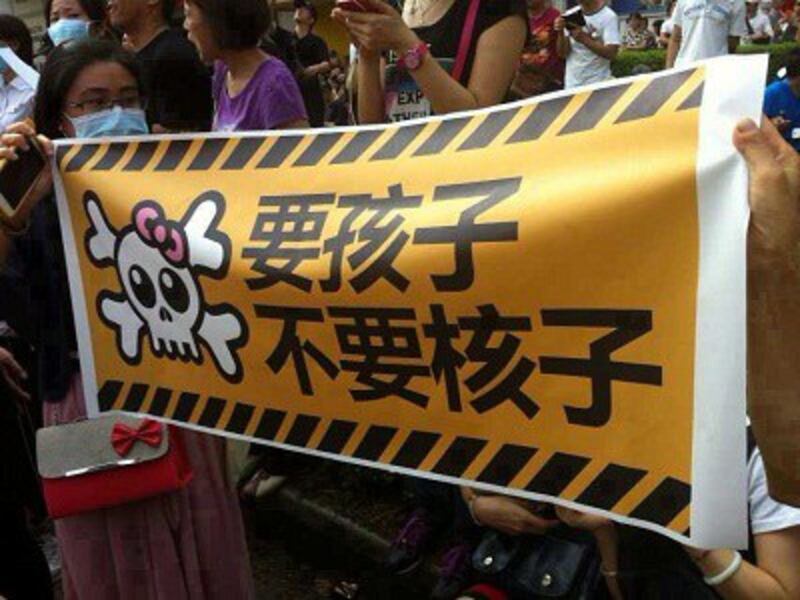Chinese authorities agreed on Friday to extend public consultations on a planned nuclear fuel processing plant near Jiangmen city in the southern province of Guangdong after hundreds of people took to the streets to express opposition to the controversial facility.
In the first of a series of demonstrations planned through the weekend, protesters marched with banners reading: "We want children, not atoms," to municipal government offices amid widespread public anger at a consultation period that was slated to last just 10 days.
"No radiation! No! No! No!," and "We want life, not GDP!," protesters chanted, referring to energy-starved China's rapid expansion of gross domestic product, a key measure of economic growth. Many of the protesters wore t-shirts with the slogan "No Nukes."
The consultation period has now been extended by 10 more days, the Jiangmen government said in a statement on its official website.
Further protests are likely on Sunday over the China National Nuclear Corporation's planned 40 billion yuan (U.S. $6.5 billion) uranium processing plant project some 90 kilometers (56 miles) north of Macau, which has raised concerns about the plans with central government in Beijing.
The Jiangmen government launched the public consultation, which would have ended on Sunday, last week to gauge public reaction.
Radiation fears
But discussion about the plant has sparked mistrust among local residents over the government's ability to prevent radiation leaking from the facility.

Both the local government and China National Nuclear Corporation have sought to reassure the public that the nuclear plant is absolutely safe, and won't cause radioactive pollution, even in extreme conditions like earthquakes.
Many in Jiangmen have the strong impression that the authorities are confident the plant will go ahead regardless of the results of environmental impact assessments or public consultations.
Local residents said more than 1,000 people had joined the protest, although the numbers couldn't be independently verified.
"There were people along every street, holding up placards and banners in protest," said a protester who gave only her surname Zhang. "There was another march in the afternoon, starting out from Donghu Park."
"We don't know whether the government will cancel the project, but we definitely want it canceled," she said.
"I think [the protests] will continue."
Protecting environment for future generations
A business owner surnamed Kuang near the municipal government buildings in Jiangmen said the marchers hailed from smaller cities and towns near the proposed plant's location, but was generally very peaceful.
"They all came over from Heshan and Taishan, protesting to protect the environment and our children and grandchildren," Kuang said.
"It was a very normal sort of protest," she added. "A lot of police vehicles came in from other areas to help, and surrounded them."
"It was packed; I could see from outside that the place was filled with people, and no traffic could get down the streets at all."
A protester who gave only his surname Teng said the public mood was single-minded on the issue: "Everyone is here to protect Jiangmen, and to ensure a good environment for our children and grandchildren; an environment without pollution," he said.
"That's all we want; it's a very clear aim."
An official who answered the phone at the Jiangmen municipal government propaganda bureau on Friday hung up after being contacted by RFA.
Worsening levels of air and water pollution, as well as disputes over the effects of heavy metals from mining and industry, have forced ordinary Chinese to become increasingly involved in environmental protection and protest.
China has a comprehensive set of environmental protection legislation, but close ties between business and officials mean that it is rarely enforced at a local level, activists and experts say.
Reported by Wen Yuqing for RFA's Cantonese Service and by Yang Fan for the Mandarin Service. Translated and written in English by Luisetta Mudie.
